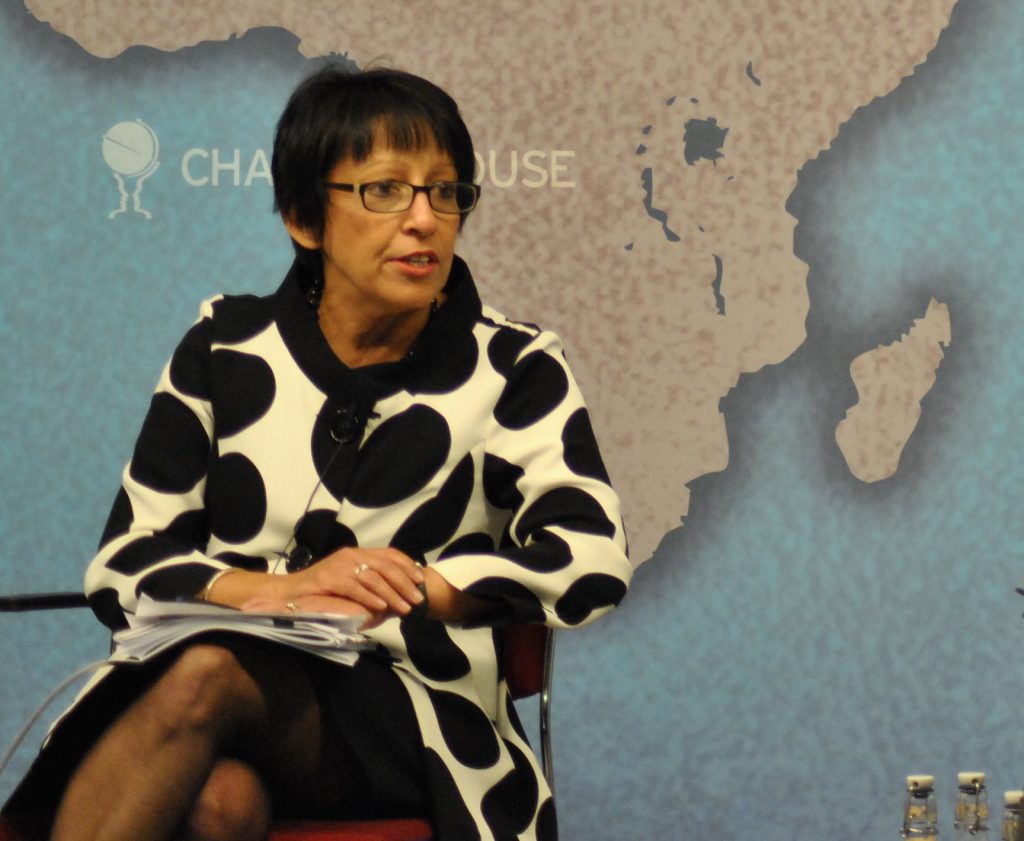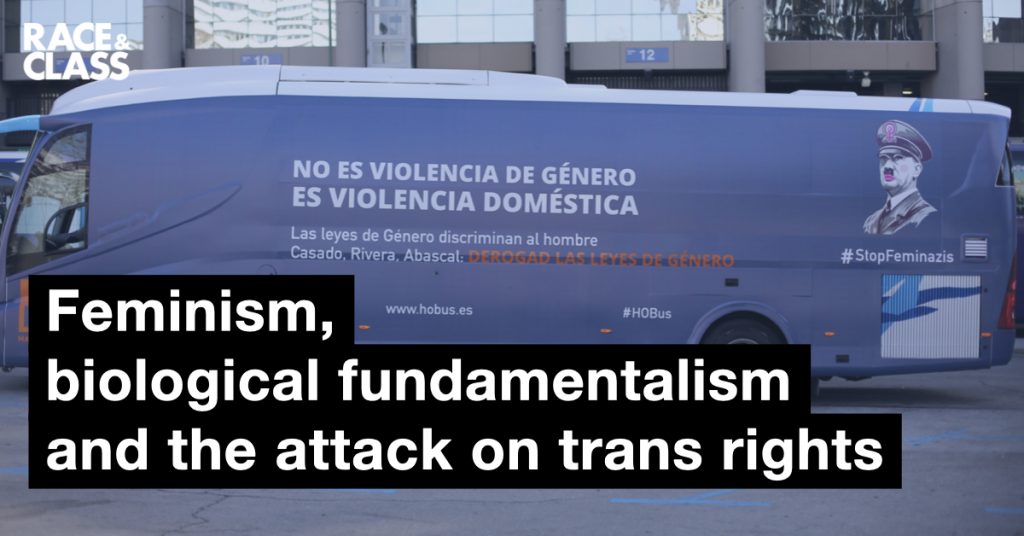Across Europe, the far Right is mobilising around sexual difference and for the forced imposition of heterosexual norms by drawing on biological arguments to border the ‘other’. Whilst we are familiar with the ways in which the far Right have long organised against the racialised ‘foreigner’ through anti-migrant and Islamophobic rhetoric, we are now seeing the ‘othering’ of anyone who does not subscribe to the tenets of the heteronormative nuclear family. Issues around reproduction, sexual difference and the family are now a key political battleground. As trans rights in the UK come under attack from powerful government and media voices, as well as ‘gender critical’ feminists, Sophia Siddiqui warns of the multiple dangers ahead when/if we cede territory to far-right ideas on innate biological difference.
Emblazoned on a bus that travelled around Madrid in 2017 was the message, ‘It’s what biology says: boys have a penis. Girls have a vulva. Say no to gender indoctrination’. A few months previously, the same vehicle was ordered off the streets by the City council, this time featuring the message: ‘Boys have a penis. Girls have a vulva. Don’t let them fool you. If you are born a man, you are a man. If you are a woman, you will continue to be so’. The ultra-conservative group Hazte Oír (Make yourself heard) was behind the campaign. In 2019, Hazte Oír launched another bus campaign, this time against ‘feminazis’, calling for the repeal of the 2004 gender violence law and legal protections for the LGBT community.
The far-right Vox party in Spain, which is expected to enter a ruling coalition in Madrid after the conservative People’s Party failed to secure a majority in the recent Madrid regional election, has backed the agenda of Hazte Oír, which, as well as targeting the trans community, has campaigned relentlessly against abortion rights and attacked LGBT groups and women’s associations. Yet despite this track record, on 23 March, Lidia Falcón, the president of the Feminist Party of Spain, joined forces with Vox against the recently proposed Trans equality law in Spain, taking part in an event organised by Hazte Oír entitled ‘Dismantling the trans law. If you are born a girl you will remain a girl’. Why are some feminists peddling the far-right agenda?

Enforcing heterosexual norms
The rigid biological notion that ‘a man is a man, a woman is a woman’, is central to how the far Right mobilises across Europe in order to enforce heterosexual norms. Hours after Viktor Orbán’s ruling Fidesz party won a vote to rule by decree indefinitely during the coronavirus pandemic, Hungary’s parliament passed a law making it impossible for transgender or intersex people to legally change their gender, further compounding the marginalisation that trans people already face. But as could have been predicted, attacks on trans rights did not end there but were quickly followed by proposed restrictions on the rights of LGBT people as a whole. In the following months, the Hungarian parliament approved a draft law that would effectively ban adoption by same-sex couples and tighten up the definition of marriage and the family unit. ‘The mother is a woman, the father is a man’, the amendment said.
Protecting the traditional nuclear family
The attack on LGBT rights in Hungary is part of a wider anti-equality stream running through European politics that discriminates against anyone who does not subscribe to the tenets of the heteronormative nuclear family. Gay and lesbian couples, trans people and progressive groups that advocate for reproductive rights and gender equality continue to be demonised under a vague and malleable ‘gender ideology’ – a useful tool to deflect from the failures of governments to handle multiple crises; instead blaming the ‘dictatorship of gender’ for the ills of society. Anti-gender movements forge a ‘symbolic glue’ between a variety of groups including religious fundamentalists, mainstream conservatives and far-right parties, all of which share the goal of preserving the traditional nuclear heteronormative family.
Moral panics around ‘LGBT ideology’ have been central to electoral campaigns, with Andrzej Duda cementing his presidential campaign in Poland in 2020 through rallying against the LGBT movement, calling it a ‘foreign ideology’ that is ‘worse than communism’, and pledging to ban the teaching of LGBT issues in schools and to restrict same-sex couples from adopting children. This is part of a concerted effort led by a close alliance between the ruling Law and Justice party and the Catholic Church, with the Archbishop of Krakow warning of a neo-Marxist ‘rainbow plague’ that would infect Poland. The equation of LGBT people with infection, plague and sexual deviancy legitimises violence on the ground, creating an increasingly hostile environment for queer people on a day-to-day basis. Activists have shown how one third of Poland, has become ‘LGBT free zones’ through the passing of resolutions in around 100 towns and regions declaring themselves free of ‘LGBT ideology’. Although these resolutions are unenforceable, they have fuelled the culture wars of Poland’s extreme-right authoritarian government.

In defence of ‘sex’: gender critical feminists against trans rights
The erosion of transgender and LGBT rights go hand-in-hand for a far Right that demonises anyone who disrupts the heteronormative vision of the family. However, we know that these views are far from limited to the far-right fringes.
The past few months have seen a backlash against trans rights in the UK, led by ‘gender critical’ feminists who contend that sex is immutable and cannot be changed.[1] Those rallying around ‘sex based rights’ almost exclusively use this argument to justify the exclusion and separation of trans people from gendered spaces and from the wider feminist and LGBT movement. What should be of concern to those advocating for a strong civil rights framework that protects all minorities from discrimination, is how ‘gender critical’ feminists play into the hands of far-right street forces and extreme-right electoral parties which would like to abolish anti-discrimination protections altogether. Time and time again, they use the same biological arguments that a ‘man is a man, a woman is a woman’, to debase the rights of trans, intersex and non-binary people – often in the name of ‘women’s rights’. Alarmingly, these ideas are fast gaining political traction, which could have a damaging effect on global feminist and LGBT movements by reinforcing conservative ideas about gender and sexuality.
Instead of accepting the myriad expressions of being a sexual subject and showing tolerance to the ambiguity that comes with being a human being, proponents of ‘gender critical’ feminism often represent trans people as sexual offenders and threats to the safety of women – arguments that hinge on their belief that trans women are not women. This clearly violates the rights and dignity of those that do not conform to the gender binary, which is protected by domestic and international human rights legislation. Safe spaces for all women and trans people are paramount, everyone deserves to feel and be protected – but this must not be based on the demonisation of those who do not conform to gender binaries. [2]
Just as scientific racism centred on supposed biological differences to classify humans in a rigid racial hierarchy, ‘gender critical’ feminists are propelling biological arguments that essentialise sex and its relation to gender identity, contending that sex is purely biological depending on what reproductive organs you have.[3] Their arguments amount to a fundamentalist approach to biology, that labels anyone who doesn’t conform to a normative view of ‘womanhood’ or ‘manhood’ as abnormal, which ultimately increases the vulnerability of an already vulnerable group of people by segregating them as ‘other’.
Protecting characteristics or protecting conservative beliefs?
The UK Equality Act 2010 prohibits discrimination on numerous grounds including both sex and gender reassignment. Beliefs can be protected if they are compatible with human dignity and not in conflict with the fundamental rights of others. However, in a deeply worrying development, the EHRC, the statutory regulator of alleged breaches of the Equality Act in the UK, formally intervened at an employment appeal tribunal in a discrimination case by a woman whose contract was not renewed because her colleagues were upset by the climate created at work due to her anti-trans views.[4] The judge ruled at the initial employment tribunal in 2019 that her ‘gender critical’ views were ‘not worthy of respect in a democratic society’… [as] it is incompatible with human rights of others’ and therefore not protected under the Equality Act.
In contrast, the EHRC stated that a ‘gender critical’ belief ‘is a philosophical belief which is protected under the Equality Act religion or belief protections’. This has been reinforced by Baroness Falkner of Margravine, the EHRC’s new chair, who said that ‘women must have the right to question transgender identity without being abused, stigmatised or risking losing their job’ and states that women must have the ‘freedom of belief’ to be able to criticise ‘gender identity’. This EHRC intervention has been described as a ‘kick in the teeth’ by Stonewall and other LGBT groups in an open letter to the EHRC, which expressed ‘frustration and disappointment’. How can ‘freedom of belief’ be protected when it infringes the human rights of others? Instead of protecting victims of anti-trans discrimination, it seems the EHRC is more concerned about protecting women who would like the freedom to discriminate against and exclude trans people.
Now, Stonewall, the largest LGBT charity in Europe, which has also drawn the wrath of the LGB alliance (a group that despite being criticised for being ‘trans-exclusionary’ was recently given charity status), is at the centre of a relentless media attack,[5] with claims that the organisation has ‘lost its way’ by becoming ‘embroiled in the trans issue’ (despite being named in tribute to riots in 1969 led by trans and gender non-conforming people). It appears that Stonewall is now the latest target of the ‘war on woke’, with moral panics being propelled around ‘the sinister power of a multi-million-pound lobbying giant, with tentacles that reach deep into hundreds of public and private organisations, to use that power to silence anyone that deviates from woke orthodoxy’. In the midst of mounting pressure,[6] the EHRC exited Stonewall’s Diversity Champions scheme due to concerns around ‘value for money’. Liz Truss, the equalities minister, is now pushing for all government departments to withdraw from the scheme.

‘If they come for me in the morning they will come for you at night’
What happens to trans rights today will have ramifications for anyone who lives outside of gender norms. With gender critical views gaining traction, we must be attuned to how these ideas play into both the far Right and electoral extreme Right’s agendas, which ultimately has implications for all minorities.
It is cause for concern that some of the most vocal attacks on trans rights come from within the queer and feminist community, particularly at a time when LGBT and reproductive rights are being eroded across Europe. Nobody from a minority group, should be campaigning for the erosion of other people’s rights in an attempt to border ‘the other’. The denial of solidarity between trans women and feminists, creating a false dichotomy between the two, detracts from issues that affect us all, such as rollbacks on reproductive rights, the epidemic of gender-based violence, attacks on LGBT rights and the entrenchment of nativist politics across Europe. Arguments that demarcate who is a ‘woman’ and who is deemed ‘other’ play directly into the far-right agenda, contributing to a right-wing moral panic and drawing lines around who is entitled to rights and who is not. We must resist this at all costs.
This article builds on ideas from a forthcoming piece, ‘Racing the nation: towards a theory of reproductive racism’ by Sophia Siddiqui, which will be published in Race & Class in October 2021. Subscribe to our newsletter to receive the piece in your inbox when it is published.

